DECOMMISSIONING OPERATIVES RECEIVE CERTIFICATES FROM SAFETY DIRECTOR
25th December 2007
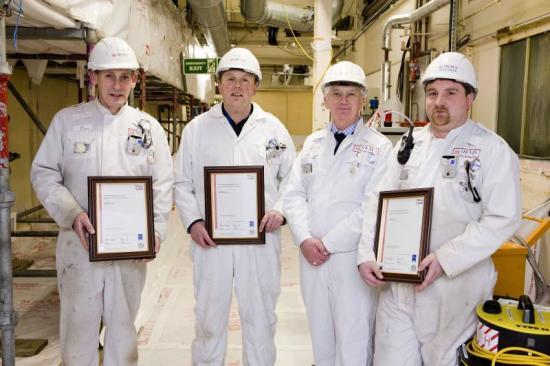
During his last visit to site Laurence Williams, Health & Safety Director, NDA presented certificates to the latest candidates who have completed their SVQ Level 2 in Nuclear Technology Decommissioning following 9 months of extensive training and assessment verification in D1204. The candidates are required to demonstrate their competence by completing a series of core units which are independently and nationally verified to maintain the required standard. Over 20 candidates have successfully completed their SVQ Level 2. Along with one UKAEA candidate, Doosan Babcock were also invited to nominate employees for the programme and the two chosen were the first contractor personnel to complete the process.
(See attached file: _MG_7224.jpg) - Pictured from left to right receiving their certificates - Maldwyn Lewis (Doosan Babcock), William Thomson (Doosan Babcock), Laurence Williams, Health & Safety Director, NDA and William Steven (UKAEA)
Related Businesses
Related Articles
UKAEA develops 3D printing for fusion components
At its recently opened Central Support Facility (CSF), UKAEA has commissioned an electron beam additive manufacturing machine that can be used to incorporate tungsten into components, alongside a selective laser manufacturing machine. Fusion can play a key role in a global low carbon energy future.Advancing Fusion Remote Maintenance: Industry Collaboration Driving Innovation
As part of the Fusion Futures (FF) programme, UKAEA's Remote Applications in Challenging Environments (RACE) has partnered with industry leaders to develop two groundbreaking technologies for remote maintenance in fusion energy engineering. Thanks to FF funding, industry has taken the lead in maturing UKAEA technology concepts—delivering real-world solutions that enhance operational autonomy and reduce maintenance burdens in extreme environments.UKAEA launches International Fellowships Scheme for fusion
UKAEA has launched the International Fellowships Scheme, an initiative to help expand the global talent pool supporting the fusion industry. The scheme is part of the UKAEA's Fusion Opportunities in Skills, Training, Education and Research (FOSTER) Programme, which aims to train, support, and empower the next generation of professionals, who will help deliver fusion power to the grid.Kyoto Fusioneering and Astral Systems join Culham fusion hub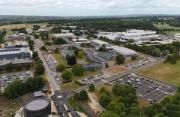
UKAEA's Culham Campus welcomes Kyoto Fusioneering and Astral Systems as its latest tenants. Two pioneering companies, Kyoto Fusioneering and Astral Systems, have joined the growing cluster of fusion technology and AI organisations at United Kingdom Atomic Energy Authority's (UKAEA) Culham Campus.
Fusion-grade Steel Produced At Scale In UK-first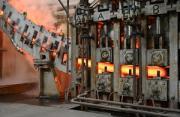
Researchers achieve 10x production cost savings for reduced activation steel. A United Kingdom Atomic Energy Authority (UKAEA) working group has successfully demonstrated the industrial scale production of fusion-grade steel.
UKAEA To Lead The Creation Of A Robotics And AI Cluster
UKAEA will lead the creation of a new £4.9m nuclear robotics and artificial intelligence cluster across Cumbria and Oxfordshire. The robotics and AI cluster was announced by UK Research and Innovation (UKRI) as one of seven new projects to kickstart economic growth and address regional needs: www.ukri.org The robotics and AI cluster will link Cumbria and Oxfordshire to accelerate the decommissioning of the UK's legacy nuclear fission facilities and keep people out of hazardous environments.
Diamonds Are Forever? World-first Carbon-14 Diamond Battery Made In Uk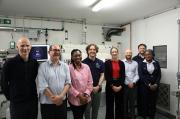
The world's first carbon-14 diamond has been produced with the potential to provide power for thousands of years. Scientists and engineers from the UK Atomic Energy Authority (UKAEA) and the University of Bristol have successfully created the world's first carbon-14 diamond battery.
UKAEA Monthly Newsletter Latest Edition
Find out what has been happening at UKAEA in our monthly newsletter. Read about our recent activities and upcoming events.
UKAEA Newsletter - Edition 11 Published Today
Find out what has been happening at UKAEA in our monthly newsletter. Read about our recent activities and upcoming events.
Corwm Visits Dounreay Nuclear Site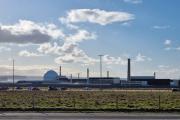
Members were given an overview of the scale of the problem and challenges faced in the decommissioning of the site. In the last week of March 2024, several members of CoRWM led by the Chair, Sir Nigel Thrift, made the long journey up to the North of Scotland to visit the Dounreay nuclear site, now managed by Nuclear Restoration Services.
